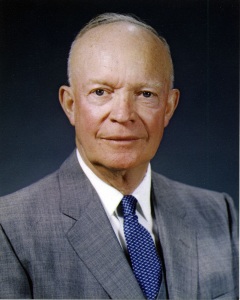
The word “leadership” brings to mind a strong and assertive image of power and direction. Time and time again, throughout history, leaders have taken charge and made names for themselves. We hail people like Julius Ceasar, Napoleon and Genghis Khan as “leaders”. However, every true leader must also possess the quality of humility and more often than not, those who do are the real world-changers. Wilberforce, Washington and King were history-makers but they possessed the humility of servant leaders. Another great humble leader, who embodied much of what we think of to be a great leader, was Dwight Eisenhower.
Dwight Eisenhower was born in Denison, Texas in 1890 to David and Ida Eisenhower. However, soon after his birth, the Eisenhower family moved to Abilene, Kansas, where David Eisenhower worked at a creamery. Growing up in Abilene, Dwight began playing football and he continued his football career at Abilene High School. When Dwight left Kansas to attend West Point, he would bring his football career with him. He graduated from West Point in 1915 and married Mamie Doud in 1916. During World War I, Eisenhower remained in the United States at a military camp in Pennsylvania.
Between the World Wars, Dwight moved up the ranks in the Army and served for some time as a military adviser in the Philippines. When the United States entered World War II in 1941, Eisenhower lead Operation Torch, the invasion of Nazi-controlled North Africa. He was also the commander of all the Allied forces in Europe and commanded the epic Normandy invasion in 1944. After World War II, he became the Supreme Allied Commander of NATO military forces and oversaw the American occupation of West Germany.
In 1952, the Republican Party encouraged “Ike” Eisenhower to run for President. During his campaign, the phrase “I Like Ike” became quite well-known and Dwight’s nickname was popularized. Ike won in a landslide and immediately set about to end the Korean War.
During his Presidency, Dwight revolutionized mass transportation when he created the Interstate Highway System. He also sought to work with the Soviet Union to ease Cold War tensions and promote peaceful atomic energy programs. He signed the 1957 Civil Rights Act and when angry Southerners threatened African-Anerican students in Little Rock, Arkansas, Ike sent in the National Guard to protect the students.
Dwight Eisenhower spent two terms in the White House before retiring to Gettysburg, Pennsylvania. Dwight Eisenhower died at a Washington D.C. hospital in 1969. His legacy was one of freedom, justice, equality progress, and innovation. Whether he was commanding Allied troops at D-Day, protecting African-American students in Arkansas or leading America towards a more peaceful future, Ike was dedicated to humbly serving his country and the high ideals for which it is exceptional.
